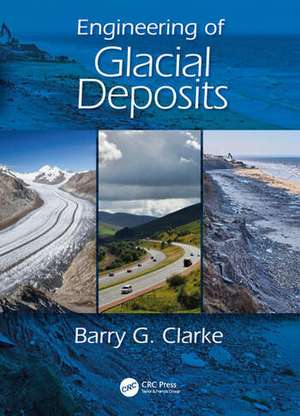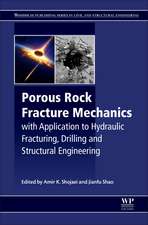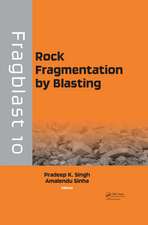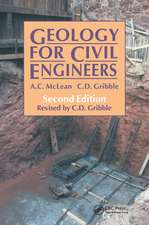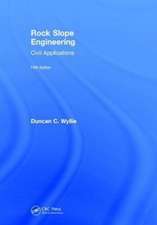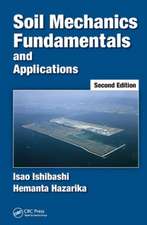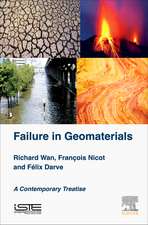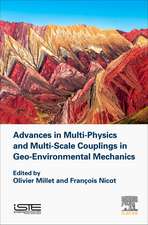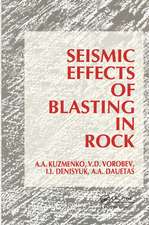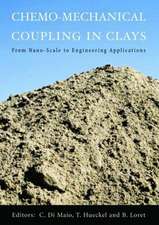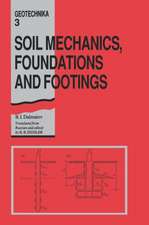Engineering of Glacial Deposits
Autor Barry G. Clarkeen Limba Engleză Hardback – 12 iun 2017
Glacial soils are composite soils with significant variations in composition and properties and are recognised as challenging soils to deal with. Understanding the environment in which they were formed and how this affects their behaviour are critical because they do not always conform to classic theories of soil mechanics.
This book is aimed at designers and contractors working in the construction and extractive industries to help them mitigate construction hazards on, with or in glacial deposits. These soils increase risks to critical infrastructure which, in the UK includes the majority of the road and rail network, coastal defences such as the fastest eroding coastline in Europe and most of the water supply reservoirs.
It brings together many years of experience of research into the behaviour of glacial deposits drawing upon published and unpublished case studies from industry. It draws on recent developments in understanding of the geological processes and the impact they have upon the engineering properties, construction processes and performance of geotechnical structures. Unlike other books on glaciation it brings together all the relevant disciplines in earth sciences and engineering to make it directly relevant to the construction industry.
| Toate formatele și edițiile | Preț | Express |
|---|---|---|
| Paperback (1) | 391.68 lei 3-5 săpt. | +25.20 lei 7-13 zile |
| CRC Press – 12 dec 2019 | 391.68 lei 3-5 săpt. | +25.20 lei 7-13 zile |
| Hardback (1) | 888.99 lei 6-8 săpt. | |
| CRC Press – 12 iun 2017 | 888.99 lei 6-8 săpt. |
Preț: 888.99 lei
Preț vechi: 1186.01 lei
-25% Nou
Puncte Express: 1333
Preț estimativ în valută:
170.10€ • 177.60$ • 140.79£
170.10€ • 177.60$ • 140.79£
Carte tipărită la comandă
Livrare economică 05-19 aprilie
Preluare comenzi: 021 569.72.76
Specificații
ISBN-13: 9780415398657
ISBN-10: 0415398657
Pagini: 504
Ilustrații: 277 Line drawings, black and white; 196 Tables, black and white
Dimensiuni: 178 x 254 x 37 mm
Greutate: 1.2 kg
Ediția:1
Editura: CRC Press
Colecția CRC Press
ISBN-10: 0415398657
Pagini: 504
Ilustrații: 277 Line drawings, black and white; 196 Tables, black and white
Dimensiuni: 178 x 254 x 37 mm
Greutate: 1.2 kg
Ediția:1
Editura: CRC Press
Colecția CRC Press
Notă biografică
Barry G. Clarke is Professor of Civil Engineering Geotechnics at the University of Leeds, UK and past president of the Institution of Civil Engineers.
Recenzii
"I know that this one is a book I shall acquire and use... it is a book that merits reading from cover to cover.
It was a delight to see a book on engineering that recognizes the important role of geological processes in forming soils, therefore explaining their properties and behavior."
-- Eddie Bromhead, retired professor and consulting engineer
"This authoritative and well referenced book contains a wealth of information about glaciation, glacial geology and the engineering aspects of construction on and in glacial deposits."
-- John Hudson, Imperial College, London and past president International Society of Rock Mechanics
It was a delight to see a book on engineering that recognizes the important role of geological processes in forming soils, therefore explaining their properties and behavior."
-- Eddie Bromhead, retired professor and consulting engineer
"This authoritative and well referenced book contains a wealth of information about glaciation, glacial geology and the engineering aspects of construction on and in glacial deposits."
-- John Hudson, Imperial College, London and past president International Society of Rock Mechanics
Cuprins
Chapter 1 Introduction1.1 Introduction1.2 Glaciation1.3 Engineering glacial soils1.4 Glacial Soil 1.5 The evolution of glacial geology1.6 ‘The past is the key to the present‘1.7 ‘Glacial soils are the most variable of all soils’1.8 ‘We know more about the stars above us than the soils beneath our feet’ (Leonardo da Vinci, c 1600)1.9 ObservationsChapter 2 Glacial Geology2.1 Introduction2.2 Glacial Soils2.2.1 Facies2.2.2 Primary Deposits2.2.2.1 Subglacial Traction Till2.2.2.1.1 Glaciotectonite2.2.2.1.2 Deformation Till2.2.2.1.3 Lodgement Till2.2.2.1.4 Comminution Till2.2.2.2 Melt Out Till2.2.3 Secondary Deposits2.2.3.1 Glaciofluvial Deposits2.2.3.2 Glacial Sedimentation2.2.3.2.1 Glaciolacustrine Deposits2.2.3.2.2 Glaciomarine Deposits2.3 Glacial Landforms2.3.1 Subglacial Landforms Formed by Ice2.3.1.1 Drumlins2.3.1.2 Flutes2.3.1.3 Rogens (ribbed moraines)2.3.1.4 Erratics2.3.2 Subglacial Landforms Formed by Water 2.3.3 Ice Margin Moraines2.3.3.1 Push Moraines2.3.3.2 Dump Moraines2.3.3.3 Ablation Moraines2.3.4 Glaciofluvial Ice Marginal Landforms2.4 Glacial Land systems2.5 Glacial Dynamics2.5.1 Glacier Movement due to Substrate Deformation2.5.2 Sliding2.5.3 Friction and Sliding2.5.4 Erosion2.5.5 Deposition2.6 Subglacial Deformation2.6.1 Hydraulic Conditions2.6.2 Deformation2.6.3 Local Deformation2.7 ObservationsChapter 3 Ground Investigation 3.1 Introduction3.2 Design of a Ground Investigation3.3 Desk Study3.4 Site Reconnaissance 3.5 Preliminary Investigation3.6 The Main I
Descriere
Glacial soils are composite soils with significant variations in composition and properties and are recognised as challenging soils to deal with – and they do not always conform to classic theories of soil mechanics.
This book for designers and contractors brings together many years of experience of research in both earth sciences and engineering into the behaviour of glacial deposits, drawing upon published and unpublished case studies from industry. It draws on recent developments in understanding of the geological processes and the impact they have upon the engineering properties, construction processes and performance of geotechnical structures.
This book for designers and contractors brings together many years of experience of research in both earth sciences and engineering into the behaviour of glacial deposits, drawing upon published and unpublished case studies from industry. It draws on recent developments in understanding of the geological processes and the impact they have upon the engineering properties, construction processes and performance of geotechnical structures.
